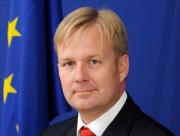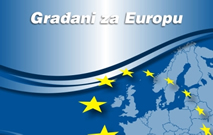''One of particular interest to me is the project assisting parturient women which helps the adoption of relevant legislation ''
Author: HoD/EUSR Peter Sørensen
 The citizens of Bosnia and Herzegovina have been marking the International Women’s Day for decades. Although having borne certain ideological connotations for a while, the very essence of March 8 is not ideological but quite noble – equality between men and women. That equality may seem a given today to some, but merely one hundred years ago, which is not a long time when put in the context of human history, women were without the right to vote, a few had higher education, they had no access to great many a jobs and were paid less. To a large degree this injustice has been rectified but more work is required in a number of areas before full equality of persons of different genders attained.
The citizens of Bosnia and Herzegovina have been marking the International Women’s Day for decades. Although having borne certain ideological connotations for a while, the very essence of March 8 is not ideological but quite noble – equality between men and women. That equality may seem a given today to some, but merely one hundred years ago, which is not a long time when put in the context of human history, women were without the right to vote, a few had higher education, they had no access to great many a jobs and were paid less. To a large degree this injustice has been rectified but more work is required in a number of areas before full equality of persons of different genders attained.
I travelled extensively throughout Europe and beyond it and have to say that some economically more developed countries could take a lesson or two from Bosnia and Herzegovina's history as far as the role of women in the society is concerned. In the course of 20th century, women in Bosnia and Herzegovina experienced equality in education and employment, professional advancement and salaries. However, current pressures including the economic crisis are putting these gains at serious risk. We have for example the situation today that some employers ask female job applicants if they are pregnant or intend to have children, and use this as a criterion in deciding whether to hire them or not. Reports are showing an increase in the number of victims of domestic violence. The negative trend may be noted also in terms of representation in the executive authorities. In 1982, Milka Planinc was the Prime Minister of Yugoslavia, while in 2012 there isn’t a single female minister in the BiH Council of Ministers.
Gender equality is of the utmost importance for the European Union and all Member States strive to achieve it. Nine Members of the European Commission are women, one of them Catherine Ashton, the Commission Vice-President and the High Representative for Foreign Affairs and Security Policy, this being one of the highest functions in the EU. The participation of women must extend also to all administrative levels and they have to be given an opportunity to advance or exercise their rights. I’m leading one of the largest EU Delegations in the world and am happy to say that the Delegation in Bosnia and Herzegovina employs more women than men.
In addition to its engagement with different political and economic activities of relevance for the European integration, the EU Delegation/EUSR in Sarajevo is also strongly committed to projects aiming to improve the lives of women in BiH. One of particular interest to me is the project assisting parturient women which helps the adoption of relevant legislation and due payment of maternity remunerations. Several hundred thousands of Euros have been invested in the work with the municipality level Gender Equality Commissions, assisting them to find the best ways to implement the Law on Gender Equality.
The role of women in the family and society is vital and while there are still some obstacles to achieving full equality, what’s important is the fact that we are committed to the endeavour. The European Union aspires to gender equality and encourages its Member States, candidates and potential candidates for membership in the Union to do the same.
In delivering flowers to women on March 8, we sincerely thank them for all their diverse contributions to our society. But men and women need to be equal throughout the year and that is what makes continuous debate about equality very necessary! I wish everyone a happy International Women's Day.


